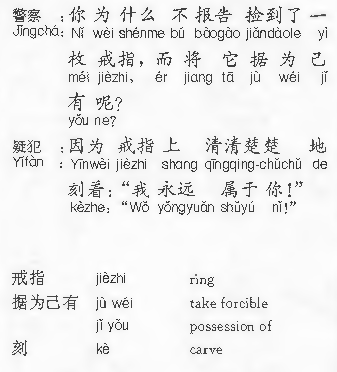
Judge: Why did you steal this car?
Thief: ‘Cause it’s parked beside the tomb. I thought its owner must have died.

Source
Liang, Yanmin. 幽默汉语 ( Humorous Chinese). 让烹诗玄 包出版社 (Beijing Language and Culture University Press), 2004
Policeman: Why did you keep the ring you found instead of reporting it to the police?
The suspect: ‘Cause it is carved clearly, “I’ll always belong to you.”

Source
Liang, Yanmin. 幽默汉语 ( Humorous Chinese). 让烹诗玄 包出版社 (Beijing Language and Culture University Press), 2004
法官:你在偷人家珠宝时,不 感到心里不安吗?
fǎguān : nǐ zài tōu rénjiā zhūbǎo shí , bù gǎndào xīn lǐ bùān má ?
小偷:先生, 老实说我当时心 里是很不安,因为我担心 偷到的是假货。
xiǎo tōu : xiānshēng , lǎoshí shuō wǒ dāngshí xīn lǐ shì hěn bù ān , yīnwéi wǒ dānxīn tōudào de shì jiǎhuò
Judge:Didn’t you feel uneasy when you were stealing those jewels?
Thief: Yes sir. To be honest, I did. I was afraid that they could be fake.
Vocabulary:
法官 fǎguān judge
珠宝 zhūbǎo jewel
不安 bùān uneasy
假货 jiǎhuò fake goods
Source
Liang, Yanmin. 幽默汉语 ( Humorous Chinese). 让烹诗玄 包出版社 (Beijing Language and Culture University Press), 2004.
Who is an atomic physicist’s favorite crime novel main character?
Perry Meson.*
Source
Thompson, Linda.
* A meson is a subatomic particle which is intermediate in mass between an electron and a proton and transmits the strong interaction that binds nucleons together in the atomic nucleus.
[While driving,] Hank picks up a hitch-hiker. After a kilometer, [the hitch-hiker] asks him: This is really nice [of you], but it’s also dangerous. What if I were a murderer?”Hank turns slowly toward his new traveling companion [and says]: “Statistically speaking, it’s more than unlikely that two murderers would be sitting in the same car at the same time.”
Hank nimmt einen Anhalter mit. Dieser fragt ihn nach einen Kilometer: “Das ist wirklich sehr nett, aber auch gefährlich. Was wenn ich ein Morder wäre?”
Hank dreht sich langsam zu seinem neuen Fahrgast: “Statistisch gesehen, ist es mehr als unwahrscheinlich, dass zur gleichen Zeit zwei Mörder in ein und demselben Wagen sitzen.”
Source
Evil Jokes: Das Witzebuch für Erwachsene, Season One, Wes Moriarty, ed. Moriarty Self-Publishing, 2019; Noderstedt: Books on Demand.
A police officer stops a driver [and] asks: “You’re weaving as you drive. Would you agree [to take] an alcohol test?”
The driver [replies]: “Bring it on – what have you got?”
Polizist hält einen Autofahrer an. Er fragt: “ Sie sind Schlangenlinien gefahren. Wän Sie mit einem Alkhoholtest einverstanden?”
Autofahrer: “Kommt drauf an. Was haben Sie den so da?”
Source
Evil Jokes: Das Witzebuch für Erwachsene, Season One, Wes Moriarty, ed. Moriarty Self-Publishing, 2019; Noderstedt: Books on Demand.
[Officer] Edgar makes the [following] radio broadcast/ call: “Car 12 to Central: we have a murder on Kettiger Street – a woman shot her husband because he ran across a freshly-washed floor.”Central: “Have you arrested the suspect?”
Edgar: “No. The floor isn’t dry yet.”
[Polizist] Edgar gibt einen Funkspruch durch: “Wagen 12 an Zentrale. Wir haben einen Mord in der Kettiger-Straße. Eine Frau hat ihren Mann erschossen, weil der über den frischgewischten Boden gelaufen ist.”
Zentrale: Habt ihr die Verdächtige festgenommen?”
Edgar: “Nein. Der Boden is noch nicht trucken.”
Source
Evil Jokes: Das Witzebuch für Erwachsene, Season One, Wes Moriarty, ed. Moriarty Self-Publishing, 2019; Noderstedt: Books on Demand.
Everything south of the border is a sea of violence and crime.
Luckily, I live in Greenland.
Source
“Greenland Jokes.” Upjoke, https://upjoke.com/greenland-jokes. Accessed 22 June 2024.
It was Sunday morning. The sun rose. Karl woke up. He got up quickly and looked out of the window. Yes, the apples were still in the neighbor’s garden. They were red and beautiful. But Karl was hungry. He was very hungry. He loved apples. Quickly he went into the garden. No one was there, because it was Sunday. His neighbor was asleep. Karl climbed the apple tree and began to eat. But the neighbor had a dog. The dog did not sleep. It saw Karl and barked. It barked loudly. The neighbor woke up. He came into the garden. He saw Karl in the apple tree and said: “What? You thief, you apple thief, are you stealing?” “Oh, no,” Karl called, “I’m not stealing anything. The apple lay in [my] father’s garden. I’m bringing the apple back. I’m tying it back onto the apple tree.”
Es war Sonntagmorgen. Die Sonne ging auf. Karl erwachte. Er stand schnell auf und sah aus den Fenster. Ja, die Äpfel weren noch in Nachbars Garten. Sie weren rot und schön. Aber Karl war hungrig. Er war sehr hungrig. Er liebte Äpfel. Schnell ging er in den Garten. Niemand war dort; den es war Sonntag. Der Nachbar schlief. Karl stieg auf den Apfelbaum und begann zu essen. Aber der Nachbar hatte einen Hund. Der Hund schlieft nicht. Er sah Karl und bellte. Er bellte laut. Der Nachbar erwachte. Er kam in den Garten. Er sah Karl auf dem Apfelbaum und sagte: “Was? Du Dieb, Du Apfeldieb, du stiehlist?” “Oh nein,” rief Karl, “ich stehle nicht. Der Apfel lag in Vaters Garten. Ich bringe den Apfel zurück. Ich binde ihn wieder an den Apfelbaum.”
Source
DeVries, Louis. Introduction to German. New York: Rinehart & Company, Inc., 1943.
